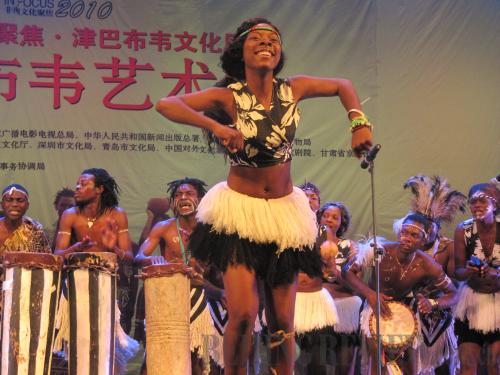|
 |
|
(PHOTO BY LIU JIAN) |
What do you want to convey to Chinese audiences through your dance drama entitled Our Zimbabwe?
[The dance] talks about the life history of Zimbabweans, our culture, tradition, music, [and] social and economic development. The dance also portrays the beautiful lands of Zimbabwe, its people, its hospitality, and we hope to use it to attract more tourists and investors to our country.
In our dance, we want to showcase the changes that have been happening after independence. Some Zimbabwean doctors [who] were trained in China went back home to invest. We have better cities now. People are now enjoying that, and there is medicine and education. Some of us, apart from being artists, went to colleges and got degrees, and now we [come] here as Zimbabwean cultural ambassadors. Our life is getting better.
How did your Chinese tour go?
I'm surprised. [China] is so developed and people are so friendly. Despite the language barrier, people could feel and dance to the music. A lot of people came to watch our performances though it was very hot. I began to feel the bond between Africa and China. We are all developing countries, but at different stages. You're older than us in terms of development. We hope we can learn something from you [about] stage management, lighting. [The] Chinese can also learn something from us.
What inspiration have you drawn from this trip?
As an artist, being here is a great advantage. It means something for the industry back home. After having shows with Chinese [dancers], there [are] one or two moves you can incorporate into your own [pieces]. To us it's great, because that's how art grows. Art is not static, and it has to move [forward]. As much as we want to present what happened in the past, we still have to develop it, so that it keeps on growing and [doesn't] get boring.
How do you see music's role in bridging cultural differences?
Music is a powerful tool that expresses social [and] economic ideologies, and bridges differences between peoples. Music plays a role of uniting people, preserving our cultural values, enhancing the interaction between continents. Music can also change people's ideology if is performed in a proper way. It can change people's picture [of] Africa – Zimbabwe in particular.
What do you think of the increased contacts between Africa and Asia?
It's lovely to see people coming from every place to watch our dances. It builds up the confidence of the artists. These people will also tell [their] people about Zimbabwe. The advertising becomes very personal. |